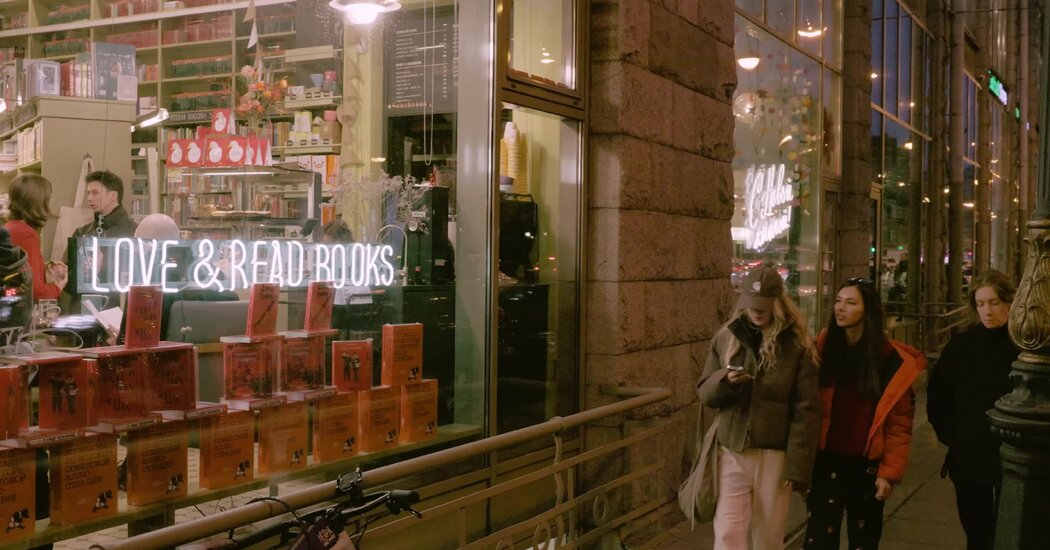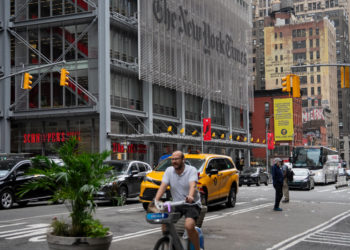A bookstore in central St. Petersburg, once a tiny Soviet relic, grew into one of the city’s cultural landmarks in just a few years. It expanded to 12 times its former size, adding two coffee shops, a souvenir department and a publishing program.
The store, Podpisniye Izdaniya, also developed a distinct identity and cachet as a refuge of ideas in an increasingly tightly controlled Russia. Its tote bags emblazoned with witty slogans let its fans recognize one another around the world. The store was even featured in the 2023 book “150 Bookstores You Need to Visit Before You Die.”
“The whole city is a fan of this place,” said Rinat Umyarov, 36, a local entrepreneur. “It is tangible proof that my generation not only lived in this city, but also created something.”
But that very success has become a problem since the invasion of Ukraine in 2022. The Kremlin has repeatedly curtailed liberties in the arts and in speech that had been taken for granted. This year, especially, the government turned its sights on books.
In May, law enforcement officials arrested three staff members of Popcorn Books and Individuum, two progressive publishing houses, charging them with “extremism” for books about the “L.G.B.T.Q. movement.” In July, a court fined Falanster, a popular bookstore in Moscow, and investigators have sifted through the shelves of others around the country.
Podpisniye Izdaniya was fined in May for selling three books, “Against Interpretation” and “On Women” by Susan Sontag, and “Everybody” by Olivia Laing. Although the titles were not banned, they contained “traces of propaganda of nontraditional sexual relations,” Russian investigators said.
Literature has always played an outsize, often uneasy role in Russian public life, alternately hailed and suppressed by those in power. Czar Nicholas I rehabilitated Alexander Pushkin, Russia’s pre-eminent poet, from internal exile, but told Pushkin that he would be the writer’s “personal censor.” Joseph Stalin phoned Boris Pasternak — who later ran afoul of Soviet authorities — to ask his opinion of another poet, Osip Mandelstam.
Unlike the robust, centralized censorship apparatus of Imperial and Soviet times, publishers and sellers in modern Russia face an evolving, opaque and inconsistently enforced set of rules. The government has imposed a series of new bans on material, ranging from L.G.B.T.Q. topics to drugs to a loosely defined “Satanist movement.”
Publishers have faced a difficult dilemma: either stop offering books that the Kremlin dislikes, clandestinely cut the risky parts or openly redact them to show readers that something was censored.
Many chose the last option, covering potentially problematic lines with thick black or gray ink. Their peers abroad criticized that approach, but in Russia it was seen as a form of protest.
“It was a political demonstration,” said Pyotr, an editor at a Russian publishing house. He requested that his surname be withheld because his employer did not authorize him to speak publicly. “It doesn’t let people forget that there is a problem.”
Until recently, Podpisniye Izdaniya (the name means “subscription publications”) was also open about censorship. Books by authors labeled “foreign agents” by the Russian state were sold in plastic packaging, with a note of apology on the cover. Now the store has had to remove those books from its shelves.
Mikhail S. Ivanov, 38, whose grandmother once ran the store, took Podpisniye Izdaniya over more than a dozen years ago and directed its metamorphosis. In 2023, Mr. Ivanov, who declined to be interviewed for this article, told a popular Russian YouTuber, “People read to understand what is going on, and to forget about what is going on.”
Walking into independent bookstores, it’s clear what is on the minds of patrons. Books grappling with difficult histories — like Sebastian Haffner’s “Defying Hitler: A Memoir” and Nikolai Epple’s “An Inconvenient Past: The Memory of State Crimes in Russia and Other Countries” — are shown prominently, and have topped the best-seller lists in recent years.
Vladimir Kharitonov, who works at Freedom Letters, a publisher that mostly operates from outside Russia, said of such books, “even if Germany is written on them, they describe the situation outside the walls of that bookstore.”
In St. Petersburg, the hometown to Fyodor Dostoyevsky and Vladimir Nabokov, bookstores have long served as community centers.
“People would step into bookstores as if they were anchors of their familiar lives, places that offered an unquestionable sense of safety,” said Maksim Mamlyga, a book critic who runs a blog about independent bookshops.
Yevgeniya Kudryashova, 33, a graphic designer, said that for her, Podpisniye Izdaniya was “an excellent illustration that you should dream big, have faith in yourself, your ideas and power.” She added that she went there to buy books for her daughter, and that popping in “has become part of our family traditions.”
The city has a bookstore for any taste: One has a reputation as a haven for activists, one is dedicated to books from Asia and another is popular with film buffs. They are concentrated around the central Liteiniy district, where many writers have lived and streets bear their names.
“We live in a special city,” said Lyubov Belyatskaya, founder of Everyone Is Free, one of the first independent bookstores in the city. “And we worked very hard to develop that culture.”
Ms. Belyatskaya introduced and promoted the idea of a “literary quarter” of St. Petersburg. She has compiled a map of more than 180 independent Russian-language bookstores around the country and beyond.
Two days before the Russian invasion of Ukraine, she and two colleagues cut out and glued “Peace to the World” — an old Soviet slogan — to a store window. For about a year it hung there, offering rare solace to the antiwar crowd. She said that some passers-by thanked her for the gesture.
But it also enraged pro-war nationalists. Someone shot through the window. The police encouraged Ms. Belyatskaya to remove the slogan.
In the Soviet Union, only books explicitly approved by the state could be obtained legally; the possession of any others was dangerous. People passed banned books among friends, sometimes to read over a single night.
Today, determined readers in Russia can get any books they want.
In coffee shops, people are openly reading “Summer in a Pioneer Tie,” a lyrical novel about two male teenagers discovering their sexuality in a summer camp. The book became a sensation, selling more than 250,000 copies before the government effectively banned it and declared the authors “foreign agents.” But people continue to find ways to buy it online.
Some publishers and bookstore owners said the Soviet system would be simpler.
“Preliminary censorship would mean rules of the game are clear,” Mr. Mamlyga said. “Right now we’re all playing Minesweeper, when you don’t understand what is forbidden and what is not.”
Russian law technically does not prohibit the sale of books by “foreign agents.” But since September, many stores have stopped selling them because the law now prohibits such individuals from engaging in “educational activities,” which can include publishing.
“This is the fundamental difference, because we now have the entire array of uncensored literature, which is now being retroactively regulated,” said Yelena Neshcheret, manager of the bookstore Vo Ves Golos and the author of “Tales of a Bookseller,” about the profession in modern Russia.
Eksmo-AST, Russia’s biggest publisher, now spends millions of dollars yearly and uses A.I. to avoid printing banned material. Recently, it redacted more than 15 percent of Roberto Carnero’s essays on the gay Italian filmmaker and writer Pier Paolo Pasolini, making some pages look like heavily classified documents.
In footnotes, the publisher said the text was redacted to comply with Russian law that prohibits “propaganda of nontraditional sexual relations.” And in a statement, it explained that its decision was “the more honest choice than simply cutting out paragraphs as if they had never existed.”
“The book becomes an artifact of the era,” the publisher said.
Ivan Nechepurenko covers Russia, Ukraine, Belarus, the countries of the Caucasus, and Central Asia.
The post In Russia, Bookstores Offer a Shrinking Refuge as Censorship Tightens appeared first on New York Times.




